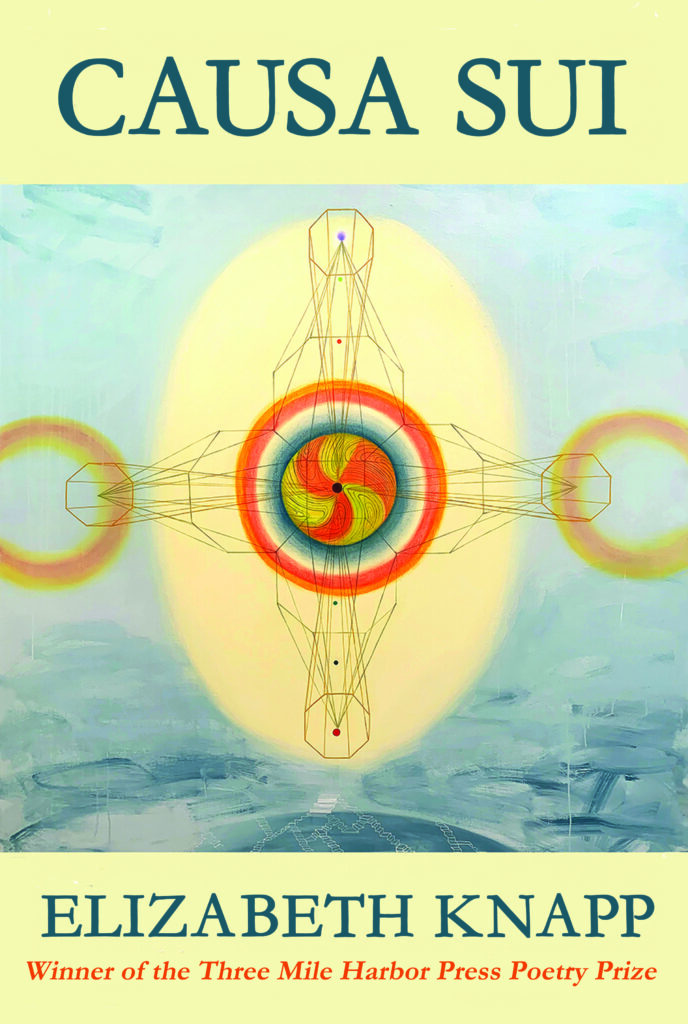-
Elizabeth Knapp
Dorian Elizabeth Knapp is the author of three poetry collections: Causa Sui (forthcoming 2025), winner of the 8th Annual Three Mile Harbor Book Award; Requiem with an Amulet in Its Beak, winner of the 2019 Jean Feldman Poetry Prize; and The Spite House, winner of the 2010 De Novo Poetry Prize. She is the founding […]continue reading…
The CAUSA SUI Interview
Palimpsest and found poems dot your latest collection—what and who has inspired you to employ these forms throughout Causa Sui?
Nicole Sealey’s The Ferguson Report: An Erasure (2023) was the inspiration for “‘We the People’: Found Poems from Project 2025.” I started that sequence as an erasure, but erasing 900+ pages of text quickly became overwhelming, so I wrote them as found poems instead. Sometimes I would pick up words and phrases from a single page, and sometimes I would start with a single word or phrase and then build the poem around it. Once I finished a poem, I would check to make sure the words I used were also included in the text of Project 2025.
The ChatGPT erasures/palimpsest poems originated from playing around with ChatGPT. The first one I wrote was “Poem in the Manner of a ChatGPT Artist’s Statement.” Writing that one made me realize that I could have some fun exploiting AI’s limitations, so I started giving ChatGPT various prompts—“Write the lyrics to a pop song about the myth of Persephone,” etc.—and then created erasures from them. Originally, I crossed out the ChatGPT text and bolded and italicized the words I chose, but then I decided I wanted the ChatGPT text to be readable, so I grayed it out, creating what you call “palimpsests.”
Thinking of your interest in Nicole Sealey’s own documentary and erasure work, I was curious whether or not you felt writing your found poems had required you to read more closely, and if you’d be willing to tell us a little about that experience?
Yes, writing “‘We the People: Found Poems from Project 2025” forced me to read Project 2025 closely, which was a chilling experience. I was struck by its comprehensiveness and how it aimed to address every aspect of American life, from social issues to the natural world. Because it’s so long, it uses a lot of words, and strange ones too, ones you wouldn’t expect to find in a political tract, such as “creatureliness.”
In a time that increasingly seems to promote LLM-based art and writing, you raise an important and exigent concern in Causa Sui, asking “Is Poetry Dead?” What do you think it will take to keep poetry alive?
The title of that poem is poking fun of articles proclaiming the death of poetry that appear every few years in magazines like Harper’s or The New Yorker. I don’t think poetry is dead or in danger of going extinct, but I am alarmed by how little poetry is currently being taught, and I do wish we lived in a country where poetry was part of the national consciousness and culture, as it is in other countries. After having experimented at length with ChatGPT, I don’t think we have anything to fear in terms of AI surpassing human capabilities when it comes to writing a poem, at least not yet.
From Britney Spears and Talking Heads, to rewriting the story of Persephone as a modern day anthem—pop music appears throughout Causa Sui. What inspired you to weave your love of pop into your writing for this collection?
This book has fewer references to pop culture and music than my second collection, Requiem with an Amulet in Its Beak, does, which contains numerous appearances by Kurt Cobain, David Bowie, and Prince. The only musicians that appear in Causa Sui are Britney Spears, Talking Heads, and Dolly Parton, and each only once. American culture is one of my primary subjects, and since pop music is a large part of American culture, musical artists appear a lot in my work.
Who are your top three artists this month?
One of my favorite contemporary novelists is R. F. Kuang. I’m reading her new novel, Katabasis, right now. Richard Siken is a favorite contemporary poet with a new collection, I Do Know Some Things. In terms of visual art, I’ve recently been introduced to Yin Xiuzhen, a contemporary Chinese sculptor and installation artist whose work I find fascinating.
In the titular poem of your collection, you reference Ernest Becker, writing: “…all human activity revolves / around the subconscious attempt to deny / the reality of our own mortality,” which echoes the Hopkins quote you open Causa Sui with. If you could pick one poem of yours to be remembered for, is there one you would choose?
I think the most significant poem from this collection is “‘We the People’: Found Poems from 2025” in terms of being a record of this moment in history. A century from now, what would a reader think about that poem and what it says about this moment in history? How will this moment be written and remembered? These are questions I ask myself all the time.
-
Featured Publication Causa Sui
Causa Sui is a collection that engages deeply with poetic tradition but, more importantly, hungers for a reality better than the one we have at hand.continue reading…
;)